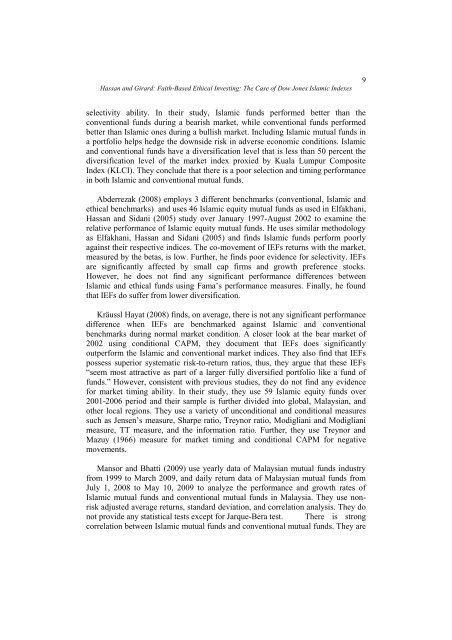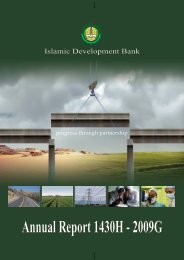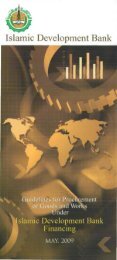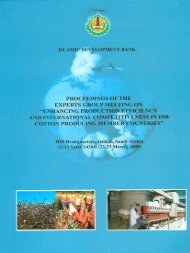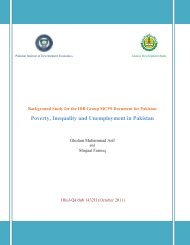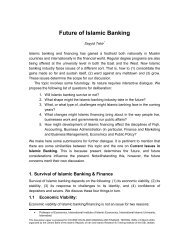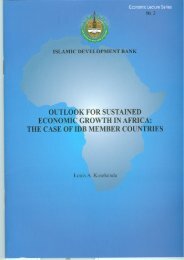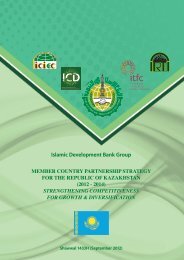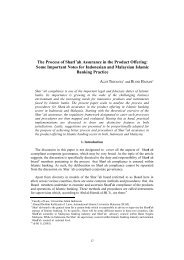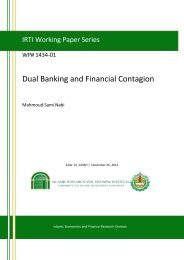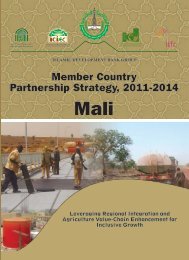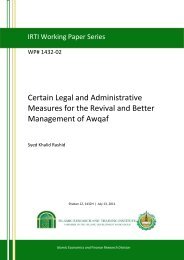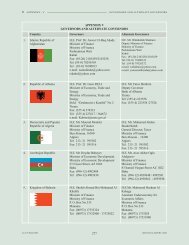faith-based ethical investing: the case of dow jones islamic ... - IRTI
faith-based ethical investing: the case of dow jones islamic ... - IRTI
faith-based ethical investing: the case of dow jones islamic ... - IRTI
- No tags were found...
Create successful ePaper yourself
Turn your PDF publications into a flip-book with our unique Google optimized e-Paper software.
Hassan and Girard: Faith-Based Ethical Investing: The Case <strong>of</strong> Dow Jones Islamic Indexes9selectivity ability. In <strong>the</strong>ir study, Islamic funds performed better than <strong>the</strong>conventional funds during a bearish market, while conventional funds performedbetter than Islamic ones during a bullish market. Including Islamic mutual funds ina portfolio helps hedge <strong>the</strong> <strong>dow</strong>nside risk in adverse economic conditions. Islamicand conventional funds have a diversification level that is less than 50 percent <strong>the</strong>diversification level <strong>of</strong> <strong>the</strong> market index proxied by Kuala Lumpur CompositeIndex (KLCI). They conclude that <strong>the</strong>re is a poor selection and timing performancein both Islamic and conventional mutual funds.Abderrezak (2008) employs 3 different benchmarks (conventional, Islamic and<strong>ethical</strong> benchmarks) and uses 46 Islamic equity mutual funds as used in Elfakhani,Hassan and Sidani (2005) study over January 1997-August 2002 to examine <strong>the</strong>relative performance <strong>of</strong> Islamic equity mutual funds. He uses similar methodologyas Elfakhani, Hassan and Sidani (2005) and finds Islamic funds perform poorlyagainst <strong>the</strong>ir respective indices. The co-movement <strong>of</strong> IEFs returns with <strong>the</strong> market,measured by <strong>the</strong> betas, is low. Fur<strong>the</strong>r, he finds poor evidence for selectivity. IEFsare significantly affected by small cap firms and growth preference stocks.However, he does not find any significant performance differences betweenIslamic and <strong>ethical</strong> funds using Fama’s performance measures. Finally, he foundthat IEFs do suffer from lower diversification.Kräussl Hayat (2008) finds, on average, <strong>the</strong>re is not any significant performancedifference when IEFs are benchmarked against Islamic and conventionalbenchmarks during normal market condition. A closer look at <strong>the</strong> bear market <strong>of</strong>2002 using conditional CAPM, <strong>the</strong>y document that IEFs does significantlyoutperform <strong>the</strong> Islamic and conventional market indices. They also find that IEFspossess superior systematic risk-to-return ratios, thus, <strong>the</strong>y argue that <strong>the</strong>se IEFs“seem most attractive as part <strong>of</strong> a larger fully diversified portfolio like a fund <strong>of</strong>funds.” However, consistent with previous studies, <strong>the</strong>y do not find any evidencefor market timing ability. In <strong>the</strong>ir study, <strong>the</strong>y use 59 Islamic equity funds over2001-2006 period and <strong>the</strong>ir sample is fur<strong>the</strong>r divided into global, Malaysian, ando<strong>the</strong>r local regions. They use a variety <strong>of</strong> unconditional and conditional measuressuch as Jensen’s measure, Sharpe ratio, Treynor ratio, Modigliani and Modiglianimeasure, TT measure, and <strong>the</strong> information ratio. Fur<strong>the</strong>r, <strong>the</strong>y use Treynor andMazuy (1966) measure for market timing and conditional CAPM for negativemovements.Mansor and Bhatti (2009) use yearly data <strong>of</strong> Malaysian mutual funds industryfrom 1999 to March 2009, and daily return data <strong>of</strong> Malaysian mutual funds fromJuly 1, 2008 to May 10, 2009 to analyze <strong>the</strong> performance and growth rates <strong>of</strong>Islamic mutual funds and conventional mutual funds in Malaysia. They use nonriskadjusted average returns, standard deviation, and correlation analysis. They donot provide any statistical tests except for Jarque-Bera test. There is strongcorrelation between Islamic mutual funds and conventional mutual funds. They are


